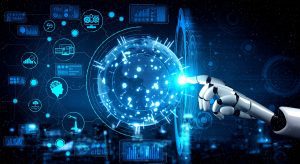Artificial Intelligence Questions and Answers (Q&A):
1. What is Artificial Intelligence (AI)?
AI refers to the simulation of human intelligence in machines programmed to think and learn like humans.
2. What are the main types of AI?
AI can be categorized into Narrow AI (weak AI) and General AI (strong AI). Narrow AI is designed for specific tasks, while General AI has the ability to understand, learn, and apply knowledge across diverse domains.
3. How does Machine Learning (ML) relate to AI?
ML is a subset of AI that focuses on developing algorithms enabling machines to learn from data and improve their performance without explicit programming.
4. What is Deep Learning?
Deep Learning is a subset of ML that involves neural networks with multiple layers, allowing machines to analyze and learn complex patterns.
5. Can AI understand natural language?
Yes, Natural Language Processing (NLP) enables AI systems to comprehend, interpret, and generate human-like language.
6. What role does AI play in businesses?
AI enhances business processes by automating tasks, improving decision-making, and providing valuable insights through data analysis.
7. Are there ethical concerns with AI?
Ethical considerations include bias in algorithms, job displacement, privacy issues, and the responsible use of AI technologies.
8. How is AI used in healthcare?
AI applications in healthcare include diagnostics, personalized medicine, predictive analytics, and robotic surgeries, improving patient outcomes.
9. What are the challenges in AI development?
Challenges include data privacy, algorithmic bias, lack of transparency, and the ethical implications of autonomous systems.
10. Can AI create art?
Yes, AI can generate art through algorithms that analyze patterns and create unique compositions, challenging traditional definitions of creativity.
11. How does AI impact job markets?
While AI may automate certain tasks, it also creates new job opportunities, particularly in AI development, maintenance, and oversight.
12. What is the future of AI?
The future of AI involves advancements in robotics, AI-driven healthcare solutions, improved natural language understanding, and increased collaboration with other technologies.
13. Are there risks associated with AI?
Risks include unintended consequences, cybersecurity threats, and the potential misuse of AI for malicious purposes.
14. Can AI replace human creativity?
AI can augment human creativity by providing inspiration and generating ideas, but the essence of creativity remains a unique human trait.
15. How can businesses adopt AI responsibly?
Responsible AI adoption involves ethical considerations, transparency, continuous monitoring, and ensuring the technology benefits society as a whole.
Enroll to our course on Udemy, titled “AI Essentials: A Beginner’s Guide to Artificial Intelligence” and unlock the power of AI in your endeavors!

Featured Online Courses:
- AI Essentials: A Beginner’s Guide to Artificial Intelligence
- Working with Python on Windows and SQL Server Databases
- Introduction to Computer Programming for Beginners
- Data Management for Beginners – Main Principles
Check Also:
Rate this article:
Reference: GnoelixiAI.com (https://www.gnoelixiai.com)
© GnoelixiAI Hub
